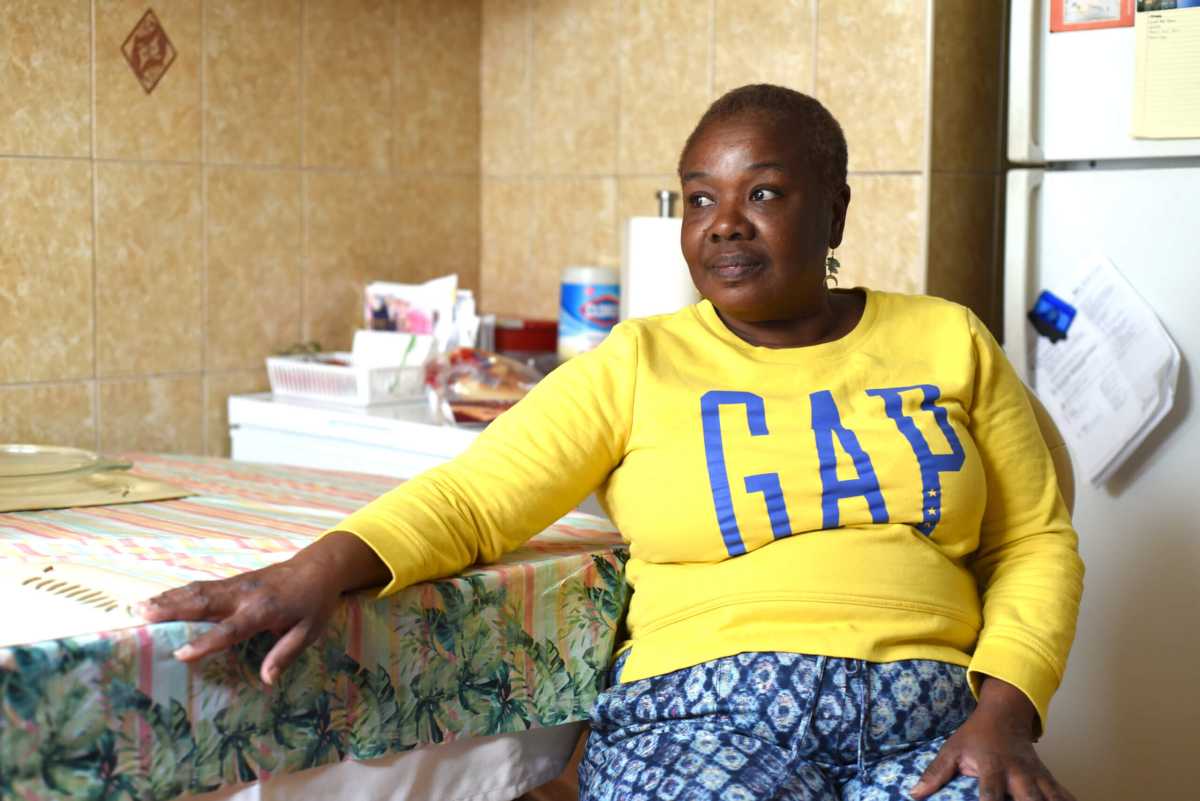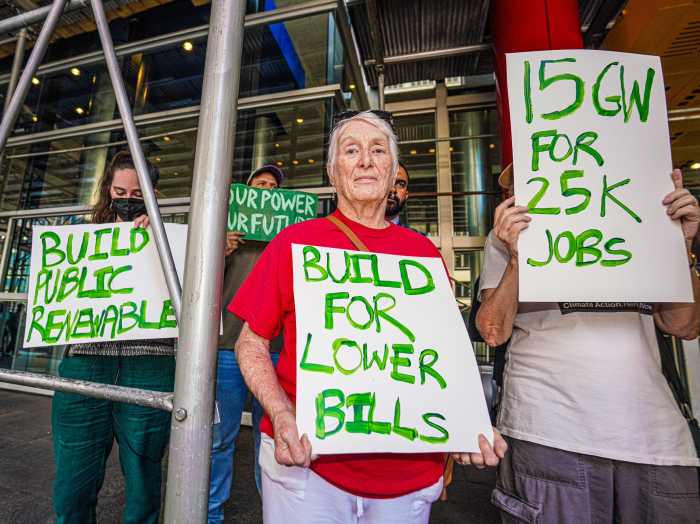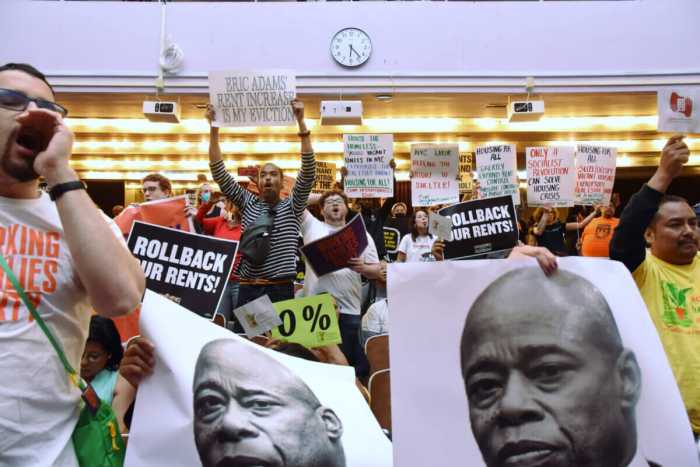Camey King has called her apartment in East New York, Brooklyn home for the past 13 years. She currently resides there with her teenage daughter and elderly mother, and has paid her rent on time ever since she moved in.
Yet she faces the prospect of being thrown out by her landlord anyway.
King — a nanny who immigrated to New York from Saint Vincent and the Grenadines — is currently facing eviction from the building’s new owner, who acquired the property after it was foreclosed upon.
Despite making her monthly rent payments, her attorneys at the Legal Aid Society noted, the building’s new owner can nonetheless force her to leave under current law.
“You have a tenant who has followed all of the rules, paid rent, done everything that we asked tenants to do, and she’s being evicted,” said Ellen Davidson, an attorney with Legal Aid’s Civil Law Reform Unit.
Legal Aid says legislation named “Good Cause” eviction, currently pending in Albany, would protect tenants in cases like King’s. The group says it must be included in this year’s state budget, which was supposed to pass April 1 and is now over two weeks late as state lawmakers and Governor Kathy Hochul continue to haggle.
If the legislation were in effect, King would be legally protected from the current eviction proceeding against her, Legal Aid says.
The bill — first introduced in 2019 — bars landlords from evicting tenants in unregulated units unless they violate the terms of their lease and caps rent increases at either 3% or 1.5 times the Consumer Price Index (CPI), whichever is greater. Proponents say the protections are needed as rents continue to soar and evictions are also on a steady rise — since the pandemic-era eviction moratorium ended early last year.
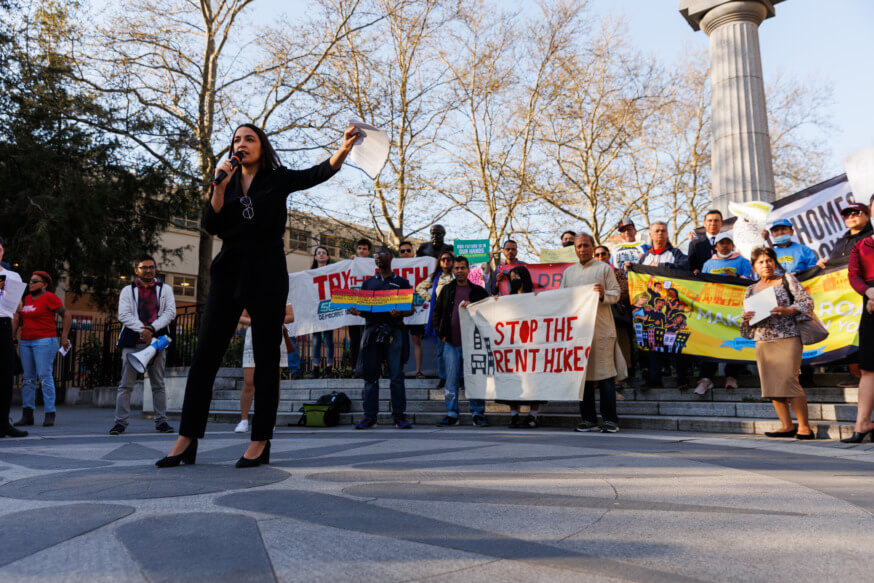
Just last week, Congress Member Alexandria Ocasio-Cortez (D-Bronx, Queens), along with the bill’s author and prime sponsor — state Senator Julia Salazar (D-Brooklyn), rallied with other left-leaning electeds in Astoria, Queens, for Good Cause and other progressive policies to be included in the budget.
“It is outrageous that thousands of people in our state are experiencing homelessness, in the wealthiest state in the country, in one of the wealthiest cities in the world, it doesn’t need to be this way,” Salazar said at the rally.
But opponents of the measure — mostly landlord groups and real estate interests — argue it would hurt small landlords and reduce the housing supply, leading to higher rents citywide.
“Good Cause Eviction is an ideologically-driven pursuit by far-left socialists that does nothing to address the housing supply shortage and would, in fact, make finding an apartment more difficult and impossibly expensive for new renters,” Greg Drilling, a spokesperson for the landlord group, Homeowners for an Affordable New York, told amNewYork Metro last month.
While both the state Senate and Assembly supported including Good Cause through their budget resolutions last month, Governor Kathy Hochul didn’t make the bill part of her $227 billion executive spending proposal in February.

An unknown foreclosure
King has lived in her three-bedroom second-floor apartment at 737 Alabama Ave. — a small semi-attached home with three units — in the East New York section of Brooklyn since late 2009.
She currently lives there with her 18-year-old daughter and 78-year-old mother, but is facing an eviction proceeding commenced by the building’s current owner, SKZF 737 MAZEL LLC — a limited liability company with an address upstate in Orange County.
For the majority of King’s years in the apartment, she had the same landlord, Grecham Best, who co-owned the building with his now ex-wife, Vernice Cecelia Best, and lived in its first-floor apartment until he lost it in foreclosure in 2021.
King paid Best $1,350 in monthly rent for most of the time she lived there, until December 2021, when he raised it to $1,400 — after the building went into foreclosure and he no longer owned it. Yet she continued to pay her rent.
Best failed to pay his outstanding mortgage and the building was ultimately foreclosed upon, according to court records. It was put up for auction in January 2020 and was sold to SKZF 737 MAZEL LLC for $525,000 in August of that year, court and property records show, but the sale wasn’t effective until Oct. 15, 2021.
Sometime after the building was turned over to the new owner, unbeknownst to King, she said she was approached by an individual representing the LLC, who told her they now owned the property. King then called Best, who was on vacation in Saint Vincent and the Grenadines, she said, and told him about the situation. He claimed he still owned the property.
“A guy came like a couple of years ago and he said that he owned the place and so I said ‘how can he own the place when I’m paying my landlord rent?’” King said. “So, when he said that I called my landlord in St. Vincent and I said ‘this guy come and say he owned the house.’ He (Best) said ‘how can he own the house? [I] own the house.’”
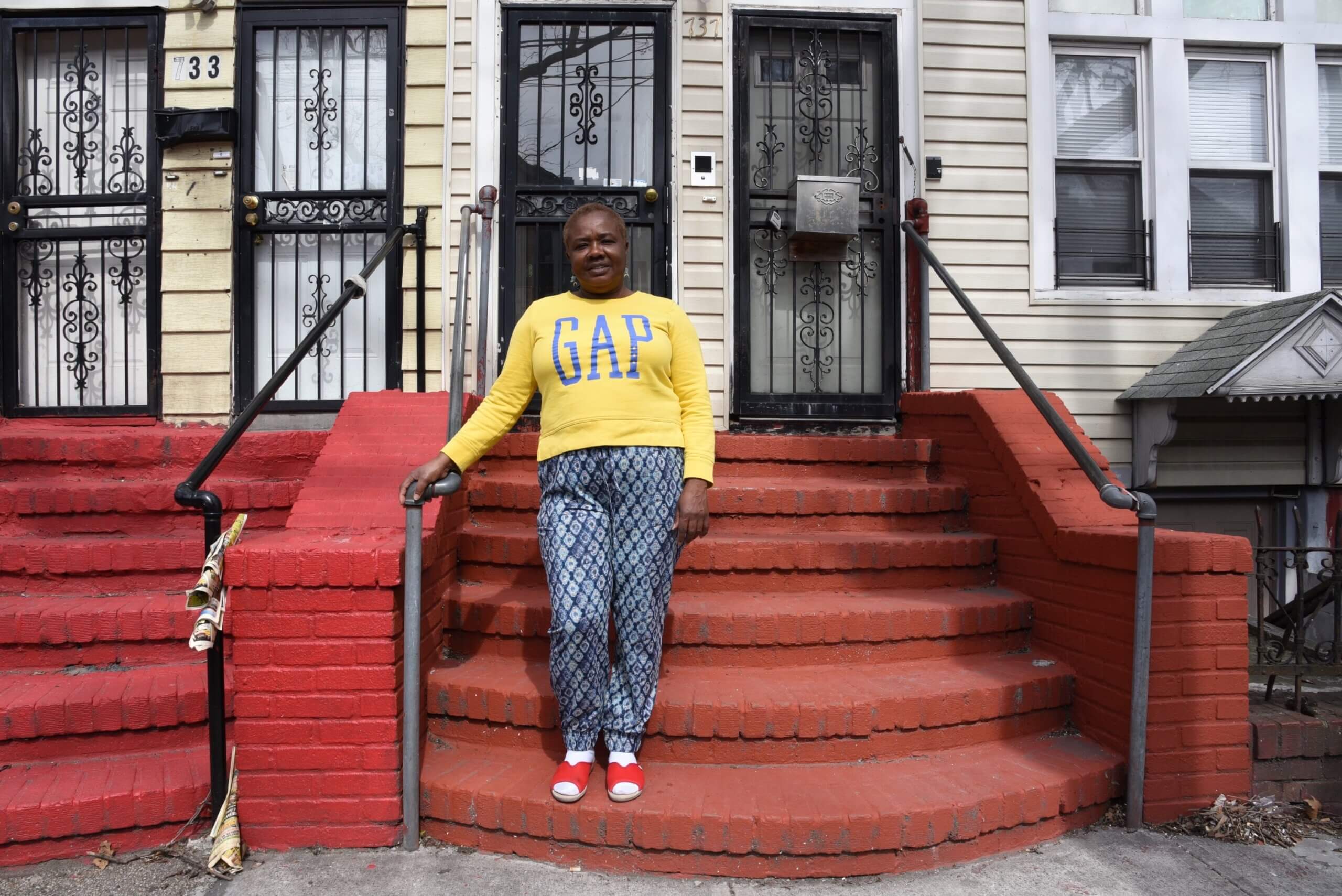
King said she believed Best because she had no reason to doubt him after being his tenant for over a decade and continued paying him rent after the building was sold.
King then received notice on March 1, 2022, to vacate the property within 10 days or face eviction, due to her lease being terminated by the new owner, court records show. Soon after that, King said, her brother-in-law discovered the property had in fact been sold to the LLC and she stopped paying rent to Best.
“Ms. King paid her rent every single month to the old owner until March 2022,” said Leigh Mangum, King’s Legal Aid attorney. “She had no idea this building had been sold in a foreclosure auction.”
King said she was caught off guard when she discovered she was being evicted.
“I was kind of emotional because there was other things going on in my life,” she said. “And as I say, I wasn’t like prepared, because I keep paying him (Best) his rent.”
Best, however, disputes King’s account.
He claims he didn’t find out about the foreclosure until late 2021, after the sale had taken place and believes he still owns the building.
“As far as I know, I own the house,” he said. “I still own the house … I got a letter stating that the house was foreclosed but nobody tell me nothing.”
Court and property records, however, clearly show that Best no longer owns the building.
King’s eviction case
The new owner then commenced a so-called “holdover” eviction proceeding against King on May 4, 2022, court records show. The case was heard at the end of July by Judge Tashanna Golden, who gave King until the end of October to find a new apartment and move out.
Due to the city’s Right-to-Counsel law, King was able to get legal representation from Mangum through Legal Aid.
But three days before she was due to vacate the unit, King filed what’s known as an Order to Show Cause to postpone the eviction date. That led the judge to extend her move out date to the end of January, according to court records. Mangum said they then got King’s move-out date pushed back a second time to May 15.
Requests by the new owner to recoup rents from King for the period since the LLC acquired the house have also been repeatedly denied, Mangum noted.
“The judge is very unsympathetic to the owner,” she said. “She has not made Ms. King pay a penny to them.”
An attorney for the current owner, Zev Schwartz, declined to comment on the case when contacted by amNewYork Metro.
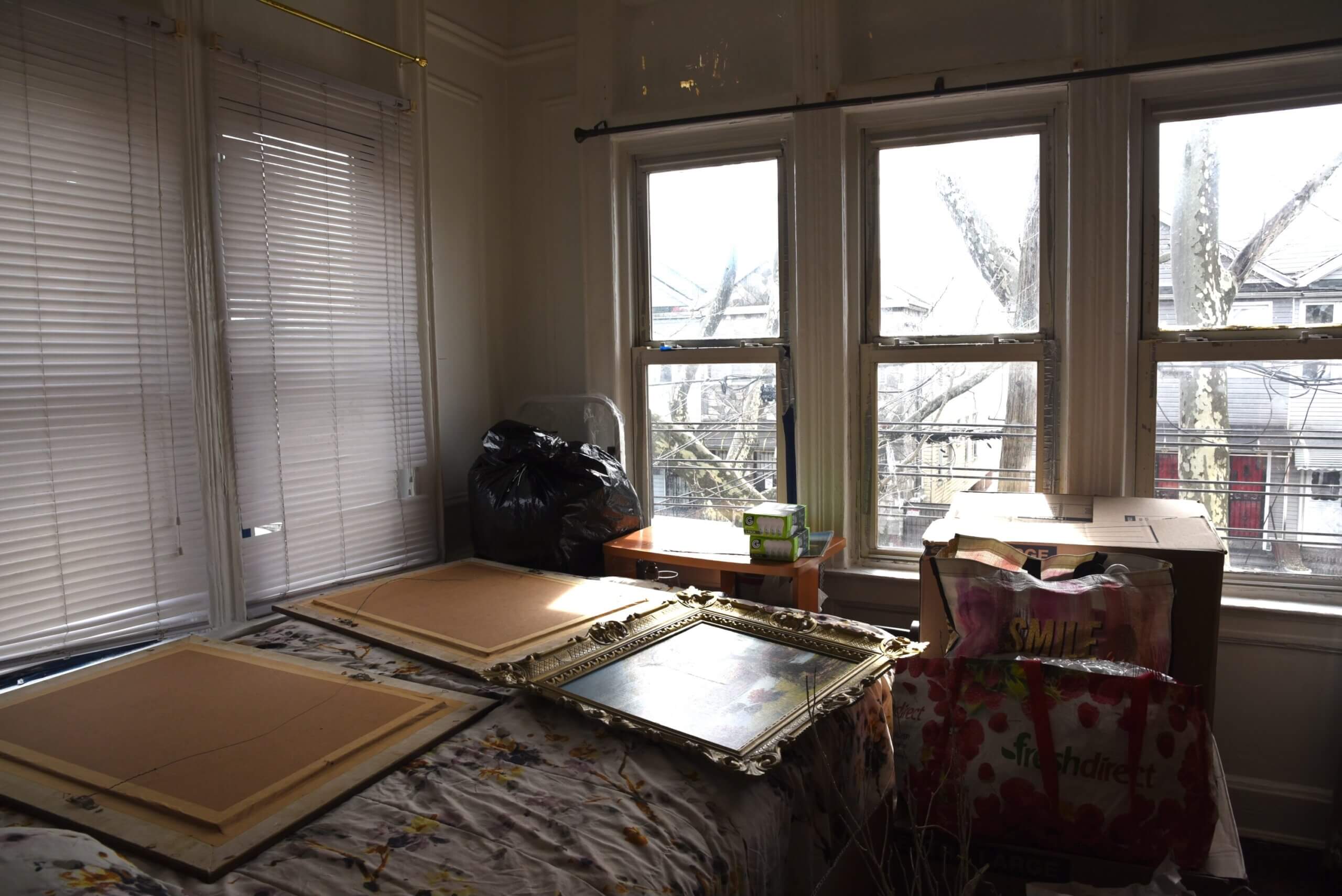
All the while, King says, she’s been looking for a new apartment by checking the real estate listings website, Trulia, daily and following leads from family and friends. But she said it’s been difficult to find a unit she qualifies for, considering many landlords require tenants to be making substantially more than the monthly rent or have a guarantor.
Judges can extend the time tenants are allowed to stay in an apartment after being evicted for up to a year, Mangum said, but King is coming up on that date. That means she could end up homeless if she doesn’t find a new place to live soon.
King said the whole experience has been particularly hard on her daughter, who has lived in the apartment since she was 5-years old. She said the ordeal contributed to her daughter — a dedicated student at Stuyvesant High School — ultimately dropping out last fall.
“She starts getting all emotional because she said she’s living there her whole life, so she don’t want to work,” King said. “She’s not even doing well, emotionally and so on. She was going to Stuyvesant school and now since last year, September, she dropped out of school.”
A case for Good Cause
King wouldn’t be facing eviction now if there were Good Cause protections, according to Davidson. That’s because even though the building changed ownership, she said, tenancies always transfer to the new owner.
“The new owner steps into the shoes of the old owner as it pertains to their tenants,” Davidson said.
Due to the fact King paid her rent on time and didn’t otherwise violate the terms of her lease with Best, Davidson said, the new owner wouldn’t be able to evict her if Good Cause were enacted.
But without Good Cause, landlords don’t have to give a specific reason for evicting tenants.
Davidson said the new owners are evicting King, “not because she’s done anything wrong, but because the landlord doesn’t have to give a reason and can just go to court and have the marshal come and evict her.”
Additionally, King would be covered by the legislation because the building is no longer owner-occupied since the LLC bought it, Mangum said. Whereas if Best still owned the property, it would qualify as an owner-occupied building with under four units, which is exempted from the bill.
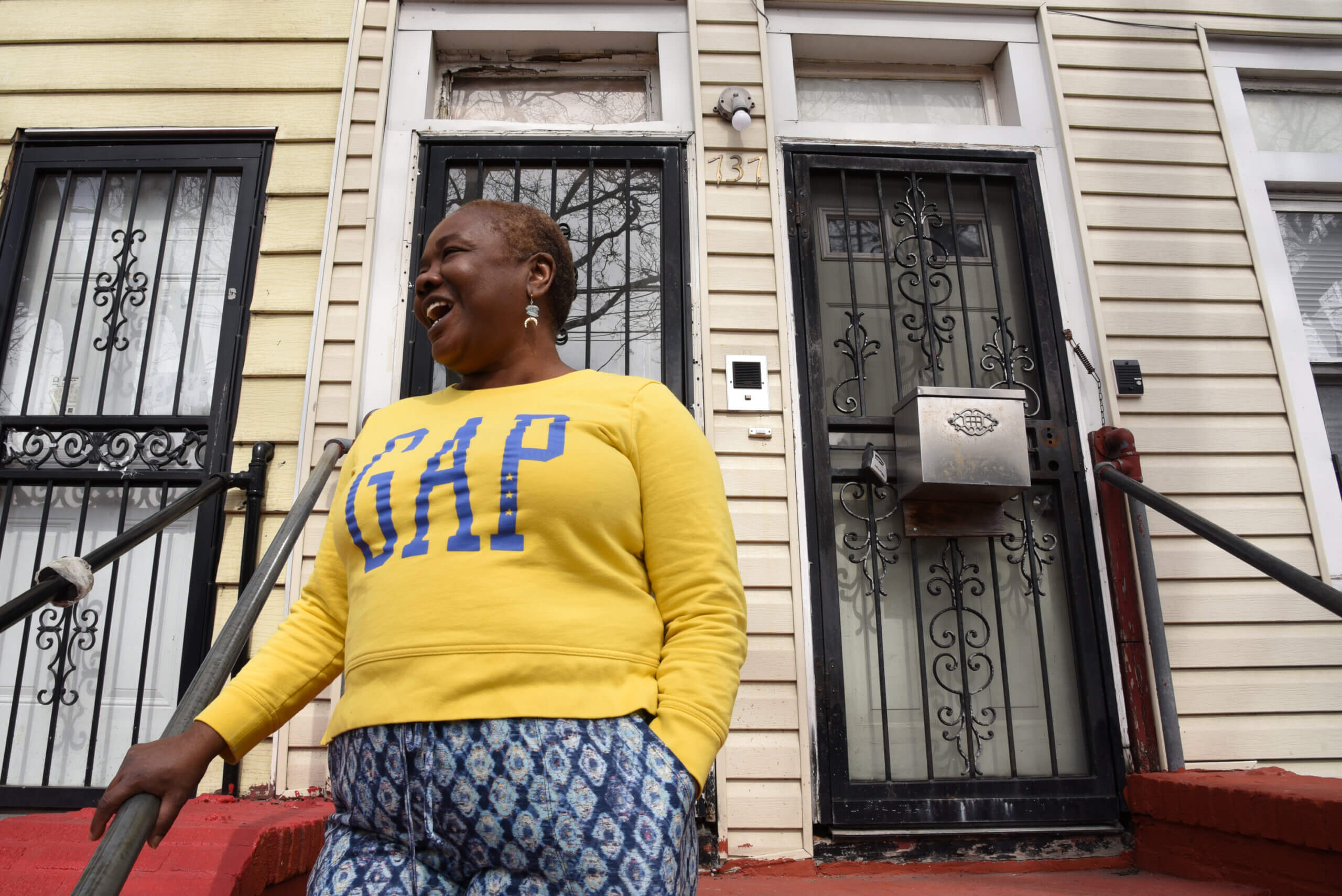
Davidson said having stable housing is essential for people being able to stay employed, for their children to achieve academically and for those with illnesses to have better health outcomes.
“Now the [King] family is going to have to go on the market at a time where rents are through the roof and try to find a new apartment and if they’re lucky, they will,” she said. “But many, many tenants these days are not lucky. And end up doubling up with family or in shelter.”
While Good Cause is part of the ongoing budget conversations, Davidson said, she can’t predict whether or not it’ll make it into the final spending plan.
“The housing crisis is worse than any time in my entire career and I’ve been a Legal Aid attorney for over 20 years,” she said. “At a certain point, our elected officials need to ask themselves, what kind of state do they want to see? Do they want to see a state where hard-working families, like the Kings, have the ability to stay? Or do they want to see a state where people like the Kings can’t afford to live?”
Read more: Mayor Adams Supports FDNY Commissioner Amid Tensions



